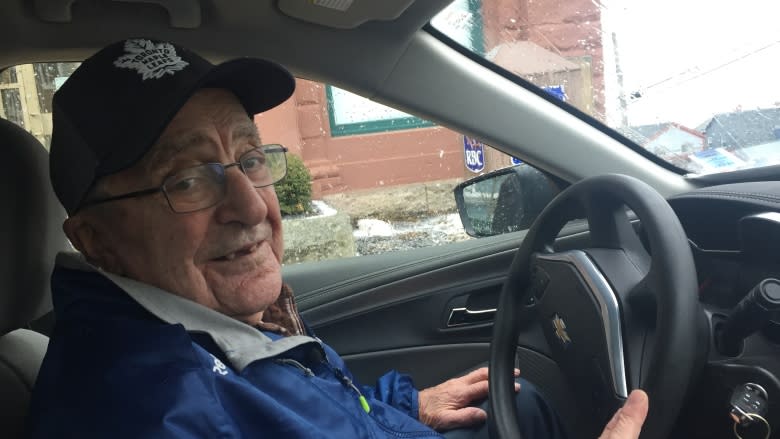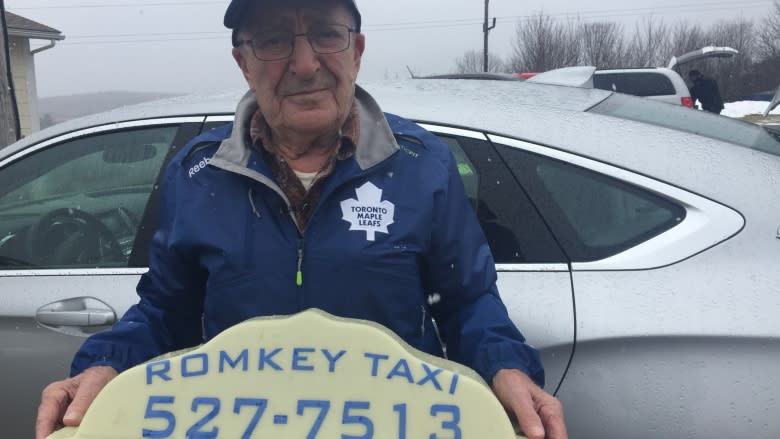A fare job: Cabbie retires after 60 years, 45 Impalas and millions of kilometres
In 1956, a young Fred Romkey turned the key on his second-hand Chevrolet to start his first day as a taxi driver. He picked up a fare in Blue Rocks, N.S., and drove him eight kilometres down the road to Lunenburg.
Romkey would keep driving for 60 years, going through about 45 Impalas (and one Plymouth) as he racked up millions of kilometres over a career that finally closed with the end of 2016.
"I love driving. I loved being around people the whole time. You learn how nice a lot of people are, and how bad a lot of people are," the 89-year-old told CBC in a phone interview this week.
"I appreciate it. I loved all of them. If it wasn't for them, well, I couldn't have kept in business. I had customers that wouldn't get nobody else — they always got me."
Outsmarting thugs and caring for the elderly
He hadn't been driving long when two young men hired him to take them from Lunenburg to Halifax, a trip of nearly 100 kilometres. On the road, they told him they were stealing his car. He swiftly outsmarted them. "I said, 'We'll get out and find out.' The two of them jumped out of the car and I just drove off," Romkey recalled.
Another time, a passenger struck him. "I got out of the car, came around, opened the door, threw him out into the gutter and then I drove off," he said.
But if you didn't try to rob or hurt him, he'd go the extra kilometre. The early years were fuelled by the vibrant fisheries and a good deal running taxis for the National Seafood Company. But that fell off as the fisheries declined in the 1980s. More and more of his businesses came from regular Lunenburgers needing a lift.
For about five years, he drove a group of ladies to play cards every Tuesday and Thursday evening. He also drove them around town in their final years. "I'll never forget the last of the ladies that I drove. She was 92 years old and she said, 'You know, it's quite a struggle when you're alone in this world.'"
Romkey drove her into town to do her errands and called his wife Marjorie. They quickly hatched a plan. On the drive home, he asked the lady if she'd like to stop by his house to visit Marjorie. "When I took her home that evening, she said, 'You know, that was a nice afternoon I spent with your wife,'" Romkey said. "Three or four days from that, she passed on. I always looked after them the best way I could."
Life-long love of Impalas
He got his first new Impala in 1958 and, starting in 1960, bought a new one every year until 1991. From then until retirement, he averaged a new Impala every other year. In all, he's gone through about 45. For 20 years, he put 200,000 kilometres on his cars annually.
"I bought a Plymouth one time. It was a friend of mine selling them. I had it for three months and gave it to my son and came right back to a Chev again," he said.
Along the way, he and Marjorie had four boys: Robert, Randy, Darren and Kevin. They lost Kevin in a car accident. Today, the three surviving sons live and work in Nova Scotia, along with four grandchildren. Marjorie died in 2011. Her obituary notes she loved being a grandmother and mother, worshipping at St. John's Anglican Church, and that she was "a great strength and support to her husband, Fred, in the operating of his taxi business."
Darren grew up to become the fire chief for the Lunenburg and District Fire Department. He remembers spending hours driving around with his dad as he worked. The long drive to the big city of Halifax was always a good time.
Pulling the cops over
"One funny story is we were on the 103 around Martins River when we came up behind a police car. It was when they first started using blue lights," Darren Romkey told CBC. "I asked him what the blue light was for. He drove right up behind it, tailgating, until lo and behold, on came the blue-and-red lights.
"When the officer asked why he was tailgating, he told him that I wanted to see the blue light. I know the officer wasn't happy — he just shook his head and gave a verbal warning!"
Often, the older ladies taking the cab left a tip for Darren too.
"But even with him putting on all these miles, he still found the time and energy to drive myself and three older brothers — and many other kids — to practices all week, and numerous games on the weekend. He didn't miss many games, and still doesn't miss any of my son's games," he said.
A long, last drive
Fred Romkey had been thinking about retiring in 2011, but losing his wife put him back on the road. He turned 89 in October 2016 and got sick in November. He decided it was time to switch the cab light off. "That was a decision I made to myself. When I felt like that, I made up my mind that I was not going to do it no more," he said.
"I was lucky to be in good shape like I am and I decided that if I wanted to stay that way, I should give up driving and start to enjoy the little life I got back."
While he misses the open road and often feels "like I should be out driving," he's found some perks in retired life. "When I wake up in the morning around 8 o'clock, I feel a lot better than I did when waking up at 5 o'clock in the morning."



